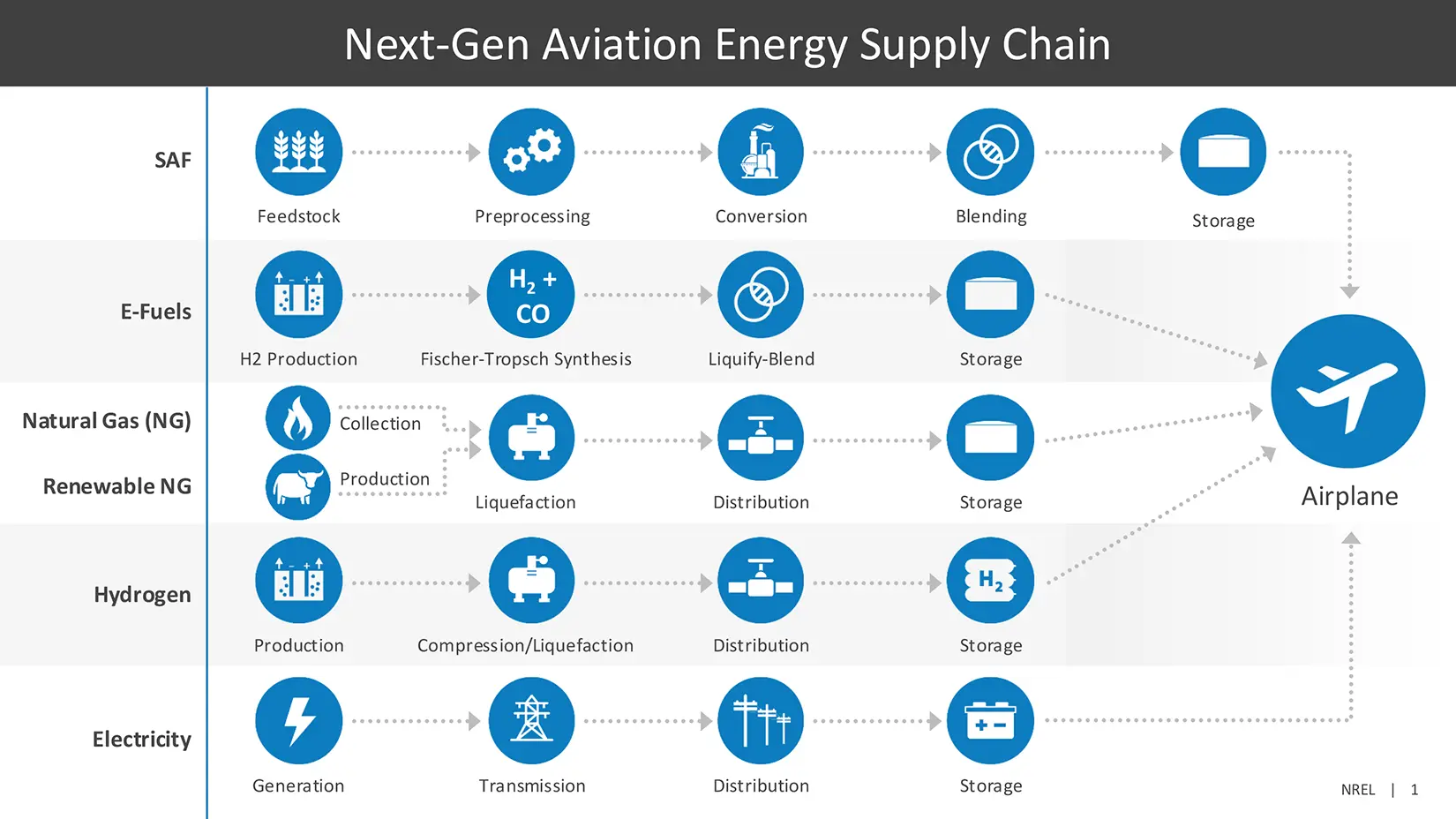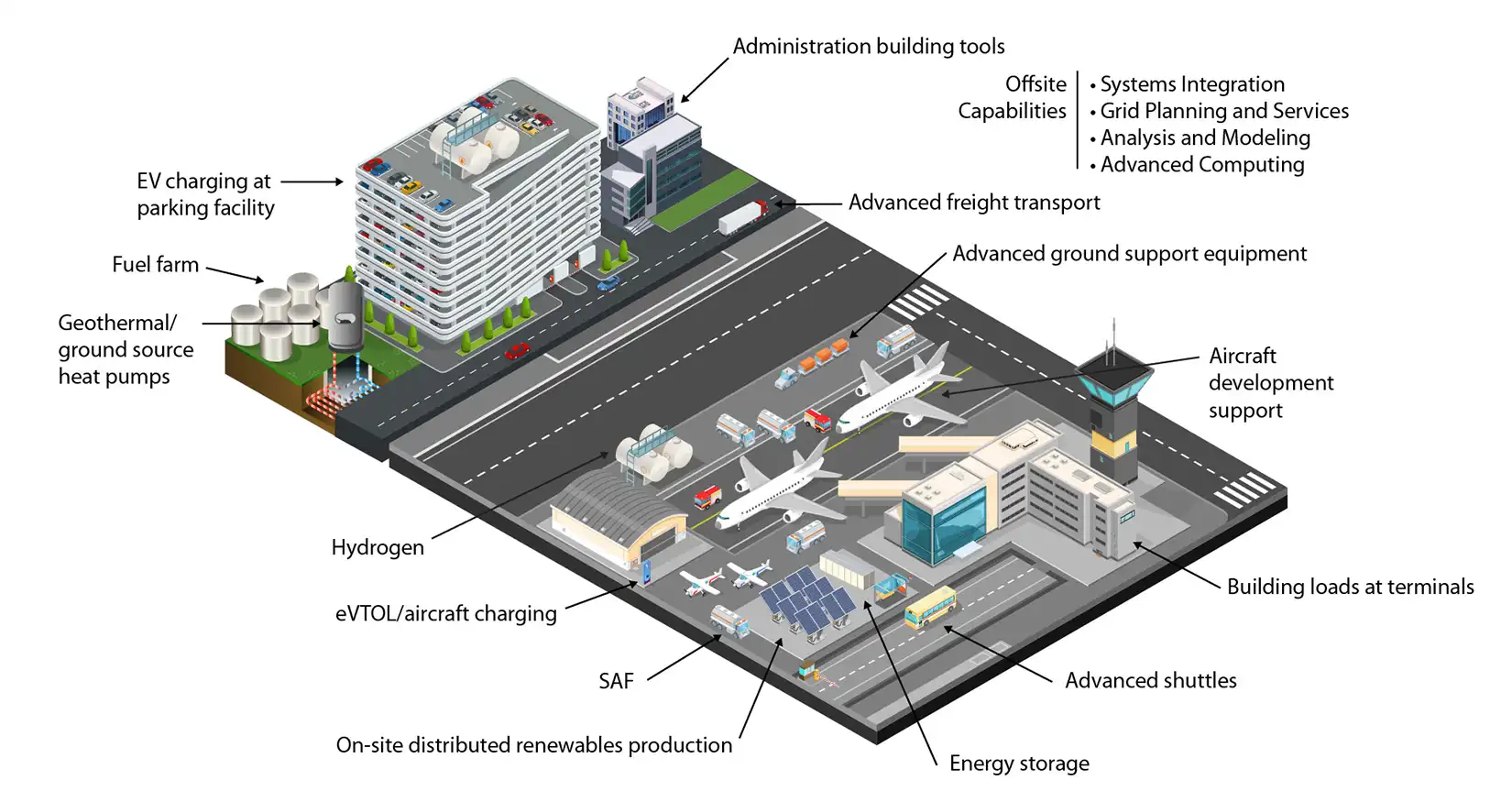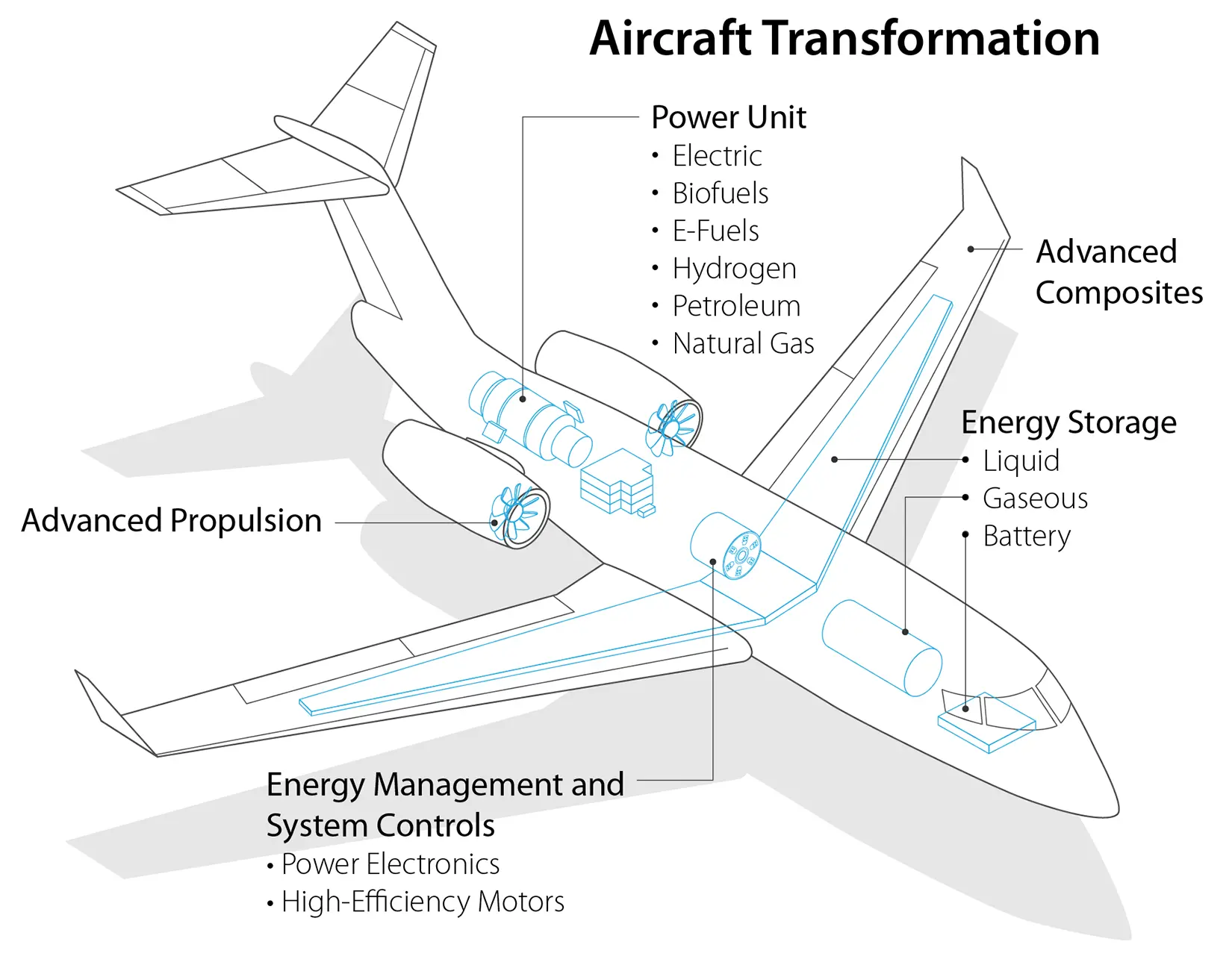Aviation Energy Futures
NREL collaborates with agencies' and aviation stakeholders to analyze, optimize, and validate advanced fuels, airport energy systems, and aircraft propulsion technologies—providing cutting-edge solutions for an efficient, affordable, and resilient aviation energy future.
Aviation is poised for growth in the coming decades. With its partners, NREL identifies critical research needs to ensure U.S. aviation has the tools, data, and advanced technologies needed to strengthen and prepare its energy systems for the path ahead.

NREL’s aviation energy futures strategy considers critical interdependencies that shape today’s aviation ecosystem.
New Aviation Fuels and Energy Carriers
NREL offers end-to-end expertise in developing, demonstrating, and de-risking aviation fuels—from field to fuel, electron to molecule, and bench to pilot scales.

NREL helps develop, optimize, and validate emerging aviation energy carriers.
SAF Pathways
NREL's biofuels and bio-based chemicals research helps develop, scale, and integrate the production of SAF, including e-fuels made by upgrading carbon dioxide (CO2) with electricity. This includes research into multiple technology pathways designed to convert fuel feedstocks—ranging from CO2 to biomass such as lignin, agricultural waste, energy crops, and algae—into finished fuels.
SAF Production Scale-Up and Piloting
NREL closely collaborates with industry partners across the supply chain to scale and pilot a range of conversion pathways.
Hydrogen and Fuel Cells
NREL's hydrogen and fuel cell research lowers the cost and increases the scale of technologies to safely make, store, move, and use hydrogen across multiple energy sectors, including in aviation. Hydrogen can be used directly as a fuel or combined with bio-based carbon or waste carbon dioxide streams to produce liquid fuels. These energy-dense fuels are compatible with today's heavy-duty truck, rail, maritime, and aviation engines.
Hydrogen Production, Storage, and Infrastructure
NREL researchers develop advanced technologies to lower the cost of hydrogen production; novel hydrogen storage materials and carriers; durable, light, efficient fuel cell technologies for long-life, high-use applications; and infrastructure technologies for fast and safe fueling.
Energy Storage
NREL develops high-performance, cost-effective, and safe energy storage systems to support transportation, including in the aviation sector.
Advanced Batteries
NREL's electrochemical storage research ranges from materials discovery and development to advanced electrode design, cell evaluation, system design and development, engendering analysis, and lifetime analysis of secondary batteries. In addition, NREL continues to explore refinements and new options—such as lithium-air, magnesium-ion, and solid-state technologies—to meet specific energy needs.
SAF Chemical Analysis and Properties
NREL scientists leverage knowledge of fuel properties to evaluate the impact of advanced jet fuels on efficiency and emissions of both reciprocating and turbine engines under all operating conditions.
Fuel Economic, Life Cycle, and Market Analysis
NREL's economic, life cycle, and market analysis researchers conduct techno-economic analysis and life cycle assessments—incorporating extensive feedstock research and biorefinery simulations—to quantify the economic impacts of biofuel production processes.
Hydrogen Technology Validation
NREL supports the hydrogen industry through partner demonstrations of new electric and hydrogen technologies, providing data collection, analysis, and dissemination and de-risking commercial deployment.
Integrated, Resilient Aviation Infrastructure
NREL analysis and modeling helps airports, military bases, and vertiports seamlessly integrate distributed energy sources with existing infrastructure, systems, and ground-based transportation.

NREL offers broad capabilities and expertise to help airports anticipate and plan for future energy needs.
Behind-the-Meter Energy Storage
As leaders in behind-the-meter storage research, NREL researchers are focusing on energy storage technologies that minimize costs and grid impacts by integrating electric vehicle and aircraft charging, solar photovoltaic generation, and energy-efficient buildings using controllable loads. This integrated approach considers all aspects of the system—from analysis to materials, whole system design, resilience planning, and controls—to meet 24-hour critical facility energy demands across distributed resources at airports.
Stationary Energy Storage
In addition, NREL's stationary battery storage research is evaluating next-generation materials for large-scale, long-life energy storage technologies.
Fast Charging
NREL researchers help assess the energy needs of electric planes, airport fleets, and aircraft ground service equipment, as airports require next-generation charging stations that provide fast charging safely and efficiently at an estimated capacity of 1 MW or more.
High-Power Charging
NREL researchers are working to accelerate high-power charging for medium- and heavy-duty commercial vehicles by designing the world’s first EV charging evaluation facility capable of handling power levels up to 20 MW at the lab’s Flatirons Campus as part of the Advanced Research on Integrated Energy Systems (ARIES) research platform. This new capability will allow researchers to run complex simulations to identify the best strategies to support MW-charging needs while reducing strain on the electrical grid.
Utility-Scale Systems Integration and Smart Charge Management
NREL's ARIES research platform unites research capabilities at multiple scales and across sectors to accelerate and de-risk high-power charging at utility scale. NREL researchers are also developing various smart-charge management strategies that will be critical to optimize the benefits and reduce the risks associated with a widespread increase in electric vehicle charging.
Risk Assessments
NREL's resilience experts assess potential risks to key airport infrastructure and help partners prepare with cost-effective and reliable solutions for meeting existing and future resilience needs, with a focus on operator up-time, efficiency, stability, and economic goals.
Threat Emulation
NREL's advanced threat emulation and other cybersecurity capabilities can help stakeholders understand best practices for securing electric charging systems, ground transportation, and other airport facilities.
Charging Hazard Mitigation
NREL outlines natural, human, and technological hazards associated with the deployment of electric aircraft and associated charging infrastructure.
Airport Digital Twins
Through the NREL-led Athena project, researchers develop digital twins of physical airport systems to improve vehicle efficiency at airports, including identifying strategies for reducing energy use, capital expenditures, and operational costs. NREL also creates detailed digital twins of airport electrical systems to help airports, utilities, and public regulators plan for potential growth.
Vehicle Selection and Rightsizing
NREL partners with airports to assist with optimal vehicle selection, charging infrastructure, load management strategies, energy supply decisions, and air pollutant mitigation.
Infrastructure Optimization
Using NREL's REopt: Renewable Energy Integration and Optimization platform, researchers evaluate the economics of various supplies and dispatchable loads at a given site, including grid energy, on-site energy generation, energy storage, and dispatchable loads.
Energy and Fuel Standards/Best Practices
NREL advises airport planners and fuel providers on standards and best practices for airport energy delivery and quality (i.e., aviation fuel, hydrogen, electricity), airport infrastructure, and regional delivery methods for introducing new products (such as SAF) into existing systems.
Vertiports and Urban Air Mobility
NREL analyzes potential impacts of vertical takeoff and landing (VTOL) energy infrastructure, considering data collected from key OEMs and potential vertiport locations.
Regional Air Mobility
NREL studies impacts of regional air mobility and electric aircraft on airport electricity infrastructure and demand.
NREL researchers use advanced methods to optimize airport building design and operations.
Building Controls
NREL develops advanced building controls for large hub airports to identify solutions that are replicable across U.S. airports. To accommodate corresponding electrical generation and infrastructure requirements, thermal energy and battery storage—combined with energy efficiency and other forms of load shifting and load shedding—can offer airports cost-effective approaches to achieving objectives and state and local energy challenges.
Integrated Energy Solutions
Also, NREL leverages its Advanced Research on Integrated Energy Systems research platform to validate and demonstrate integrated solutions that:
- Mitigate integration challenges with high-power charging
- Utilize controllable building and charging loads to minimize or counteract electrification peak load induced instabilities
- Enhance resilience, reduce operating costs, and de-risk implementation.
Efficient, High-Performance Aircraft
NREL develops and validates next-generation aircraft motors, electronics, components, and systems to enable new fuel types, high-performance propulsion pathways, and efficient energy systems. NREL’s aircraft research applies to a variety of aircraft, from conventional narrow-body jets to advanced air mobility modes.

NREL's expertise on vehicle systems, energy storage, and power units supports the development of next-generation aircraft.
Electric Aircraft
Aircraft electrification relies heavily on advanced power electronics to distribute the proper amount and type of power between system components such as batteries, inverters, power electronics, chargers, and electric machines. NREL's advanced power electronics and electric machines research optimizes power systems to decrease costs, reduce component size, and improve system performance, reliability, and efficiency. Existing projects support the development of innovative lightweight and ultra-efficient electric motors, motor drives, and thermal management systems for advanced aviation.
Vehicle Energy Storage
The greater power requirements and system integration demands of aircraft pose significant challenges to energy storage technologies. NREL researchers work hand-in-hand with industry partners to address transportation energy storage challenges with new materials and processes for a full range of energy storage assets to power tomorrow's energy-efficient vehicles and aircraft.
Battery Safety
NREL provides a comprehensive review of battery safety that integrates multiscale, multidomain models with sophisticated experimental characterization capabilities.
Battery Recycling and Second Life
NREL explores ways to reduce the amount of critical materials they require and increase the lifetime value of battery materials—including repurposing for a second application and recycling materials.
SAF Combustion Simulation
To advance the understanding of new low-carbon SAF and its impact on turbine engine performance, NREL's fuels and combustion researchers use an innovative combination of fuel property measurement, molecular-level chemistry models, and detailed simulations.
NREL helps aviation stakeholders understand whether a new drop-in jet fuel candidate can pass performance, health, and safety qualifications for commercialization. In doing so, NREL also identifies efficient and more cost-competitive advanced aviation solutions.
Hydrogen Fueling Systems and Infrastructure
Researchers use NREL’s high-flow hydrogen fueling research platform to evaluate hydrogen components and fueling protocols for heavy-duty transportation, stationary, and portable applications. Combined with thermodynamic modeling, these capabilities make it possible to evaluate a range of hydrogen station configurations and associated control strategies at airports, enabling aircraft and equipment manufacturers to improve component design, lower costs, and reduce downtime.
Fuel Cell Materials and Manufacturing
NREL has multiple specialized energy sciences laboratories to develop, characterize, fabricate, manufacture, and validate hydrogen fuel cell components and systems. Researchers use these capabilities to develop advanced hydrogen detection technologies, evaluate the electrochemical properties of novel materials, develop and test advanced materials and cells for fuel cells, and develop methods to scale up energy technology manufacturing.
Advanced Air Mobility
NREL's research portfolio examines various facets of advanced air mobility, including urban air mobility, concentrating on the feasibility, opportunities, and challenges of deploying infrastructure effectively.
Regional Air Mobility
NREL examines the operational requirements and technical challenges of supporting an influx of short-haul electric flights at existing transportation hubs, including major airports. Small electric aircraft could potentially leverage lower operating costs, therefore offering an attractive opportunity for operators to provide direct service between rural communities and large-hub airports, closing the rural–urban transportation gap.
Publications
View all NREL aviation energy futures publications, and publications for the Athena airport modeling project.
Developing Open-Source Tools for Increasing the Efficiency of Synthetic Aviation Turbine Fuel Certification Process, NREL Technical Report (2025)
Sustainable Aviation Fuel Blending and Logistics, NREL Technical Report (2024)
Sustainable Aviation Fuel (SAF) State-of-Industry Report: State of SAF Production Process, NREL Technical Report (2024)
Sustainable Aviation Fuel State-of-Industry Report: Hydroprocessed Esters and Fatty Acids Pathway, NREL Technical Report (2024)
The Challenge Ahead: A Critical Perspective on Meeting U.S. Growth Targets for Sustainable
Aviation Fuel, NREL Technical Report (2024)
Browse more NREL sustainable aviation technical reports.
Explore fact sheets on emerging topic areas in energy and aviation, and what they could mean in the push to decarbonize the sector.
2024 Sustainable Aviation Energy Conference: 5 Key Messages From the Airport Enabling Efforts Workshop, NREL Fact Sheet (2024)
2024 Sustainable Aviation Energy Conference: 5 Key Messages From the Sustainable Aviation Fuel Workshop, NREL Fact Sheet (2024)
2024 Sustainable Aviation Energy Conference: 5 Key Messages From the Alternative Fueling (Energy) Infrastructure Workshop, NREL Fact Sheet (2024)
2024 Sustainable Aviation Energy Conference: 5 Key Messages From the Accelerating Aerospace Technology Deployment Workshop, NREL Fact Sheet (2024)
Aviation Energy Research and Operation Simulator (AEROSim), NREL Fact Sheet (2024)
Accelerating Sustainable Aviation Fuel Technology From Laboratory to Deployment: An Overview of NREL’s Sustainable Aviation Fuel Pathways, NREL Brochure (2023)
Sustainable Aviation for Developing Economies, NREL Fact Sheet (2023)
Browse more NREL sustainable aviation fact sheets and brochures.
Partner With NREL
NREL works with stakeholders from across the aviation ecosystem to identify critical research needs. In this way, cross-sector collaboration helps create targeted solutions for an efficient, affordable, and resilient future for aviation energy.
Learn how to partner with NREL.
Contact
Share
Last Updated June 27, 2025
